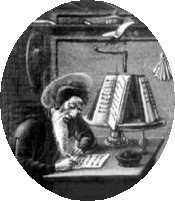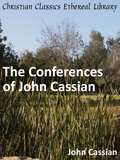John Cassian
Monk
Biography
Johannes Cassianus, born in 359 or 360, died between 440 and 450, and was educated in a monastery at Bethlehem, under the tutelage of abbot Germanus. In 390 the master and his pupil, now two friends, made a pilgrimage to the Egyptian hermits; and this oasis of stillness and quiet, situated on the very confines of the confusion and restlessness of the ancient world, made so deep an impression on the two wanderers, that they remained there for seven years. Leaving Egypt, they repaired to Constantinople, where Cassianus was consecrated a deacon by Chrysostom; but after the overthrow of Chrysostom in 404, Cassianus went to Rome alone. Of Germanus nothing more is heard.
The sack of Rome by Alaric made upon Cassianus the impression that peace and safety could not be attained except by leaving society and the stir of the multitude, and settling down in solitude. He went to Massilia, founded two monasteries (one for men and one for women), and wrote, for the instruction of his pupils, De Caenohioruni Institutis Libri XII, and Collationes Patrum XXIV. In the former, he gives first the external rules after which a hermit's life is led, and second he describes the internal labor by which the final goal is reached. In the latter he gives his experiences from the Egyptian hermits. By these books, and by his two foundations, he introduced monasticism in the Western Church.
Also from another side the Western Church was deeply moved at that moment by the genius of St. Augustine. But the discrepancy between the ideas of St. Augustine and the theological system of the Eastern Church, in which Cassianus was educated, was so great, that he never felt able to adopt such doctrines as those of predestination, the irresistibility of grace, etc. He did not separate himself, however, so far from the views of St. Augustine as to embrace those of Pelagius. On the contrary, on the instance of Leo the Great, he wrote his De Incarnatione Libri VII., directly against Nestorianism, but indirectly against Pelagianism; and thus he became the founder and first representative of semi-Pelagianism. The best collected edition of his works is that by Gazeus, Douai, 1616, which has been often reprinted, latest at Leipzig, 1733. An accurate analysis of his stand-point has been given by G. Fr.Wiggers: Darstellung des Augustinismus und Pelagianismus, 1833, II. pp. 6-183. [There is an Italian translation of Cassianus's work, Venice, 1663, and a French, Paris, 1667.]

